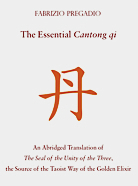Readers' Reviews to the Unabridged Edition
 The Cantong qi is a pillar of China's religious tradition and is also one of its most mystifying and puzzling texts. Pregadio, editor of Encyclopedia of Taoism, is the leading expert on this text and on the field of Chinese alchemy in which the text is situated. His account of its origin and history is masterly. He shows that its roots lie in the study of the Book of Changes that occupied scholars in the 2nd century CE and their thoughts on analogies between micro- and macrocosm. Untangling a web of hagiographic fiction, he proposes 450 CE as the date when the text's composition process arrived at a first conclusion. From the 8th century CE onwards, it was adopted by practitioners of Neidan (Internal Alchemy) and thus came to strongly influence meditation practices well into the 19th century. Today, the text still has a considerable audience, which adds to the importance of Pregadio's book. It contains the text's first reliable English translation, which is moreover eminently readable, explanatory notes, an annotated edition of the Chinese text, index, glossary, and enough lists of tables and figures to allow even the nonspecialist to follow the text's reasoning and directly enter the world of Daoist cosmological speculation. (Full text of review by Barbara Hendrischke, University of Sydney, in Religious Studies Review, 38.4, December 2012, p. 259)
The Cantong qi is a pillar of China's religious tradition and is also one of its most mystifying and puzzling texts. Pregadio, editor of Encyclopedia of Taoism, is the leading expert on this text and on the field of Chinese alchemy in which the text is situated. His account of its origin and history is masterly. He shows that its roots lie in the study of the Book of Changes that occupied scholars in the 2nd century CE and their thoughts on analogies between micro- and macrocosm. Untangling a web of hagiographic fiction, he proposes 450 CE as the date when the text's composition process arrived at a first conclusion. From the 8th century CE onwards, it was adopted by practitioners of Neidan (Internal Alchemy) and thus came to strongly influence meditation practices well into the 19th century. Today, the text still has a considerable audience, which adds to the importance of Pregadio's book. It contains the text's first reliable English translation, which is moreover eminently readable, explanatory notes, an annotated edition of the Chinese text, index, glossary, and enough lists of tables and figures to allow even the nonspecialist to follow the text's reasoning and directly enter the world of Daoist cosmological speculation. (Full text of review by Barbara Hendrischke, University of Sydney, in Religious Studies Review, 38.4, December 2012, p. 259)
 "[Pregadio] offers a glimpse of the painstaking detective work required to produce a high quality translation. . . . He faithfully translates the Can Tong Qi into readable English without sacrificing the richness of the original. . . . Fabrizio Pregadio's translation of the Zhou Yi Can Tong Qi is a remarkable contribution to those interested in the study of Taoism and Internal Alchemy. Very few of the old texts have been translated into English, let alone with such high quality." (Shawn Cartwright, Traditional Chinese Culture Institute International - Read the original review)
"[Pregadio] offers a glimpse of the painstaking detective work required to produce a high quality translation. . . . He faithfully translates the Can Tong Qi into readable English without sacrificing the richness of the original. . . . Fabrizio Pregadio's translation of the Zhou Yi Can Tong Qi is a remarkable contribution to those interested in the study of Taoism and Internal Alchemy. Very few of the old texts have been translated into English, let alone with such high quality." (Shawn Cartwright, Traditional Chinese Culture Institute International - Read the original review)
 ★ ★ ★ ★ ★ Best translation of Cantong qi. — [Pregadio] offers in this translation with commentary, a very readable and clearly explained version of an extremely important inner alchemy work called "Can tong qi" (Pronounced "tsan tong chi" in modern accent). In a very readable introduction (pp. 1-63) the origin and content of the present text is examined, after which the text itself is translated, pp. 69-126. The most important contribution of Pregadio's work is found in the extensive notes, pp. 130 to 244, which are easily understood by the lay person . . . A must read! Recommended for university courses as well as the general public! (Prof. Michael Saso - Read the original review)
★ ★ ★ ★ ★ Best translation of Cantong qi. — [Pregadio] offers in this translation with commentary, a very readable and clearly explained version of an extremely important inner alchemy work called "Can tong qi" (Pronounced "tsan tong chi" in modern accent). In a very readable introduction (pp. 1-63) the origin and content of the present text is examined, after which the text itself is translated, pp. 69-126. The most important contribution of Pregadio's work is found in the extensive notes, pp. 130 to 244, which are easily understood by the lay person . . . A must read! Recommended for university courses as well as the general public! (Prof. Michael Saso - Read the original review)
 "[This book] has already opened my eyes to things that I would not have appreciated before." (Email from a Reader)
"[This book] has already opened my eyes to things that I would not have appreciated before." (Email from a Reader)








